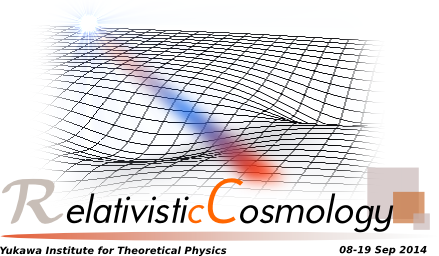
Basic schedule
- CONFERENCE
- 8-19 Sep 2014
- Some seminars takes place at K202, K206
- 1-DAY WORKSHOP
- 9, 16 Sep 2014
- Held at Panasonic Auditorium, Yukawa Hall.
Agenda
Upcoming galaxy surveys are probing ever larger scales with ever greater precision. These surveys also probe galaxies at higher redshifts where the Hubble scale is smaller and General Relativistic (GR) effects become more important. On such large scales, we need to rethink what we actually measure in galaxy surveys. We observe galaxies on the past light cone and it is not possible to define an over-density of galaxies in the Newtonian way. These GR corrections need to be taken into account consistently in order to extract cosmological information precisely. These corrections also play important role when extracting information of the very early universe through non-Gaussianity cosmological perturbations. Precision measurements of galaxy distributions will also enable us to test GR itself. The discovery of the accelerated expansion of the Universe has come relatively late in our study of the cosmos, but in showing that gravity can act repulsively, it has opened up many new questions about the nature of gravity and what the Universe might contain. Is the acceleration being driven by dark energy? Or is GR itself in error, requiring a modification at large scales to account for the late acceleration? Structure formation in our Universe can be different even if the geometry of the homogeneous and isotropic universe is the same in these two classes of models, offering a possibility to distinguish between them observationally.
The aim of this workshop is to discuss the observational aspects of the role of gravity beyond the Newtonian concept, and to exchange the ideas to establish the new approach on this issue. We plan to invite several people from abroad with expertise in the subjects, and to mainly discuss two topics: relativistic effects in cosmology in the first week, and modified theories of gravity and cosmological tests of gravity in the second week. We will organize one-day meeting at the beginning of each week to provide an overview of the subjects. In addition, we plan to have a series of informal seminars during the week in addition to informal discussions on specialized subjects.
Invited researchers
- David Wands (Portsmouth)
- Marco Bruni (Portsmouth)
- Gianmassimo Tasinato (Portsmouth)
- Tsutomu Kobayashi (Rikkyo)
- Shinji Mukohyama (Kavli IPMU)
- Masahiro Takada (Kavli IPMU)
- Shuichiro Yokoyama (ICRR)
Local organising comittee
- Takashi Hiramatsu (YITP),
- Kazuya Koyama (ICG, Portsmouth, Co-chair),
- Misao Sasaki (YITP),
- Atsushi Taruya (YITP, Chair)